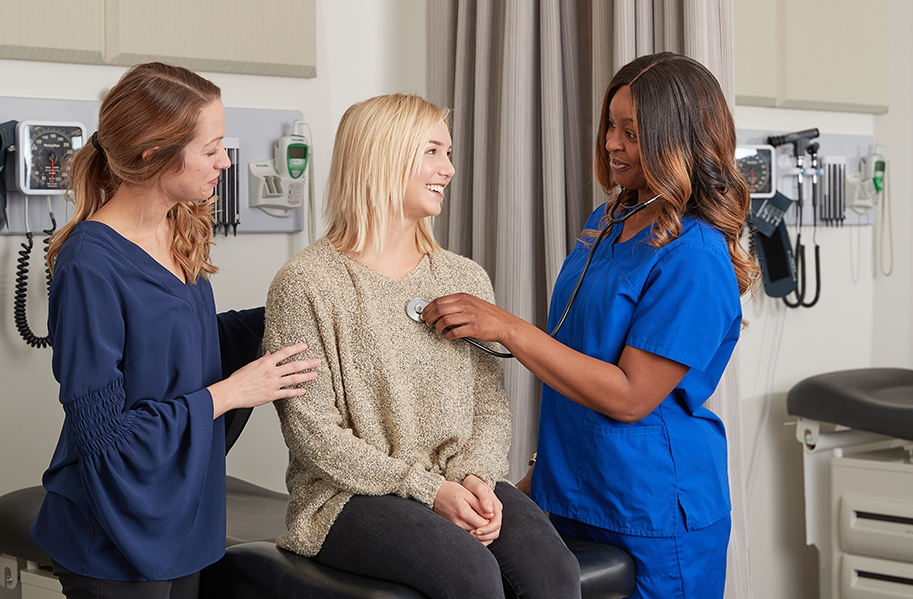College of Health Sciences
Medical Assisting (Academic Minor)

The College of Health Sciences offers a 24-credit-hour minor in Medical Assisting available to all students, regardless of major. This program serves students in various disciplines who are interested in learning about and/or working within the healthcare field. The minor is intended to enrich your current plan of study and provide an opportunity to learn valuable skills applicable in the clinical setting.
Medical assistants are currently in high demandand they are widely employed in outpatient clinics, medical offices, hospitals, nursing homes and other medical establishments. The work that was once performed by registered nurses (e.g., medical history, vital signs, phlebotomy, medication administration, EKG, etc.) is now often performed by medical assistants who support nurses, nurse practitioners, physician assistants and doctors.
Coursework in the Medical Assisting minor allows you to obtain the necessary knowledge and practical skills needed to sit for the national certification exam in medical assisting. If you do not desire to obtain a certificate, the coursework should be helpful if you choose to pursue other entry-level healthcare positions for which such knowledge and skills may be desired.
You may be interested in this minor if you are working part time as a medical assistant while completing your undergraduate degree. If you plan to apply to graduate programs which require patient contact hours prior to acceptance, this minor may be for you. The knowledge and skills gained through the minor coursework help you to become more marketable for entry-level healthcare employment opportunities.
The 24-hour Medical Assisting minor is very manageable. In particular, if you are already required to take Anatomy and Physiology I and II with the labs (eight hours), the minor will only require an additional 16 credit hours. For students within the College of Health Sciences who are required to take HMSE 2000 (two hours), the minor requires only an additional 14 credit hours.
If you secure a certificate in medical assisting or work as a medical assistant, you may be eligible for additional Credit for Prior Learning (CLP).
Coursework
BIOL 2010/2011 (4) Detailed study of structure and functions of human organism; credit not acceptable for Biology major or minor. Laboratory observations, demonstrations and experiments designed to help students develop a working knowledge of anatomy and physiology. Topics covered are anatomical terminology, genetics, and the integumentary, skeletal, muscular, and nervous systems.
BIOL 2020/2021 (4) Continuation of BIOL 2010. Laboratory observations, demonstrations and experiments
designed to help students develop a working knowledge of anatomy and physiology. Topics
covered are the special senses, and the circulatory, cardiovascular, respiratory,
digestive, urinary, and reproductive systems.
Prerequisite/s: BIOL 2010/2011
HMSE 2000 (2) Foundations of medical language with specific emphasis on terminology and nomenclature for health and sport sciences.
HLSC 3000 (3) Introduction to medical assisting and medical office management within the healthcare
team. Topics such as legal and ethical considerations affecting the medical assistant,
safety, medical emergencies, basic pharmacology, nutritional requirements, and rehabilitation
procedures will be explored.
Prerequisite/s: BIOL 2010/2011, BIOL2020/2021, HMSE 2000
*Note: This course may be substituted if the student completes ESMS 4903 during spring
2019
HLSC 3001 (4) Instruction in basic laboratory techniques and clinical exam room procedures
used by the medical assistant. Topics include vital signs, EKGs, preparing and administering
medications, collecting and processing specimens, phlebotomy, and related tasks.
Prerequisite/s: BIOL 2010/2011, BIOL2020/2021, HMSE 2000
*Note: This course may be substituted if the student completes ESMS 4904 during spring
2019
HLSC 3002 (3) Concepts of Medical Assistant-patient interactions through written, verbal and
electronic forms of communication. Students will explore topics such as active listening,
nonverbal communication, therapeutic communication, fundamental writing skills, proper
telephone etiquette and related tasks.
Prerequisite/s: BIOL 2010/2011, BIOL2020/2021, HMSE 2000
HLSC 3003 (3) Introduction to medical office administration responsibilities for Medical Assistants.
Topics such as medical coding and billing, health insurance, medical record management,
and patient scheduling will be covered.
Prerequisite/s: BIOL 2010/2011, BIOL2020/2021, HMSE 2000
HLSC 3004 (1) A review of concepts for students preparing to take the Medical Assisting certification
examination.
Prerequisites: BIOL 2010/2011, BIOL2020/202, HMSE 2000, HLSC 3000, HLSC 3001, HLSC
3002, HLSC 3003

For more information:
Tara Hunter, MS, RN
tmhill@memphis.edu
